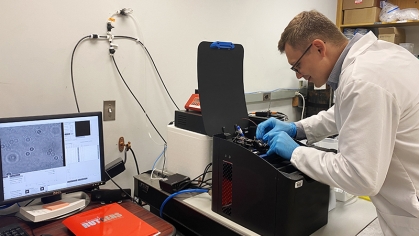Shirin Jalali is NSF CAREER Award Recipient
Five-year grant supports development of a theoretical platform for designing snapshot compressive imaging systems

Department of Electrical and Computer Engineering (ECE) assistant professor Sirin Jalal has been awarded a $554,656 National Science Foundation (NSF) CAREER award to provide a theoretical framework to design, analyze, and optimize snapshot compressive imaging systems (SCI).
The highly competitive and respected NSF CAREER grant funds research and educational initiatives of faculty at the beginning of their careers. Jalali who earned her doctoral degree in electrical engineering from Stanford University, joined the ECE faculty in January 2022.
“Shirin’s NSF CAREER award enhances the growing reputation and visibility of the School of Engineering’s ECE department by supporting her leading-edge research and training of students on the critical area of theoretical foundations for SCI,” says ECE professor and department chair Yingying Chen.
Enabling Effective 3D Imaging
The ability to capture high-resolution 3D data cubes, such as video files or hyperspectral images (HIS), is essential for many medical and robotic applications. SCI can solve the process’s time-consuming, costly, and ineffective issues by enabling efficient 3D imaging.
Jalali says the award is especially exciting because “SCI systems can potentially speed up a wide range of imaging applications, such as hyperspectral imaging and optical coherence tomography, which are used to diagnose certain diseases. Improving the speed of these imaging systems can make them accessible to everyone and create new opportunities for applications in everything from medical diagnosis and robotics to agriculture.”
According to Jalali, the new project interfaces with her recent research focus on analyzing and developing theoretically founded solutions for inverse problems observed in various computational imaging systems. She will draw on the tools and techniques she’s developed while working on aspects of several other inverse problems.
“I am hopeful that the results of my NSF CAREER project will lead to a generic theoretically founded framework that enables researchers on the one hand to design efficient recovery solutions for various SCI systems and on the other hand to optimize different aspects of their hardware systems,” she says.
Funding for Student Recruitment
NSF CAREER grants include an educational component. Jalali’s award will fund her recruitment and training of PhD students on the theoretical foundations of imaging sciences.
“I hope that research on this project enables graduate students to design next-generation imaging solutions,” she says. “Students will be involved in different aspects of the project --- from addressing fundamental theoretical questions about these systems to designing and implementing efficient state-of-the-art algorithms.”


